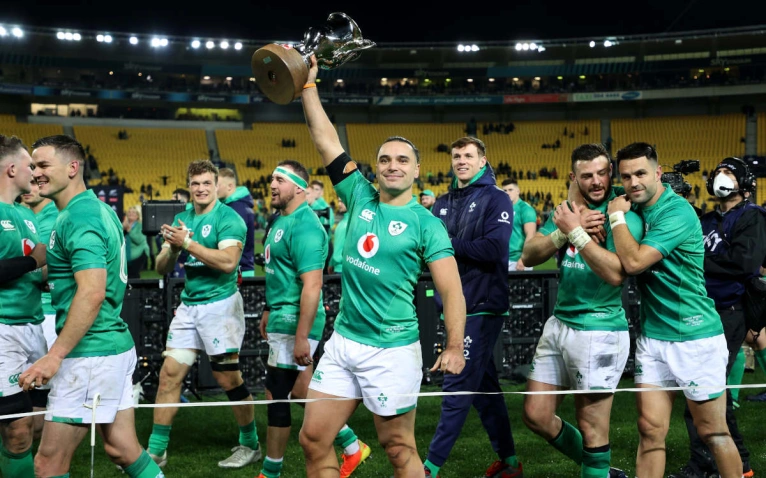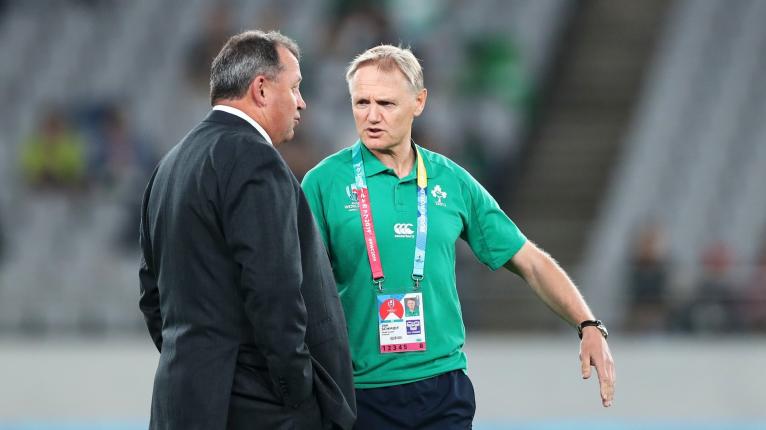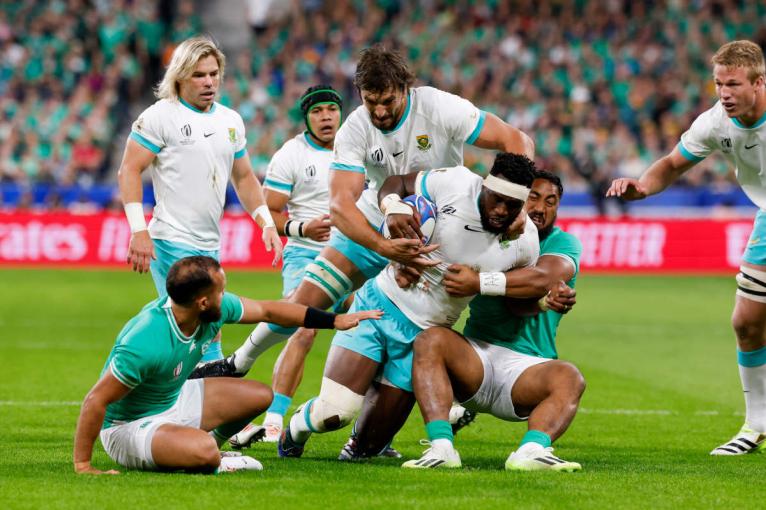The game that New Zealand Rugby has been waiting for is almost here. Their moment of truth is coming when they will find out whether a decision made 13 months ago is as smart as they believe it is.
The game is a likely World Cup quarter-final against Ireland. While it’s by no means locked in yet and Scotland and Italy will both feel they can prevent it from eventuating, it’s easy enough, using current rankings, to believe that Ireland will top Pool B and New Zealand finish second in Pool A to set-up what will be a repeat of the 2019 quarter-final.
Certainly, NZR have been thinking about this possibility – probability – for the better part of a year now. In fact, for a period in July and August last year, they thought about little else.
The drama started after Ireland did what so few teams have ever done – and certainly none of their predecessors got remotely close to doing, which was to win a series against the All Blacks in New Zealand.
It was a stunning achievement by the Irish and one they fully deserved. They played brilliant rugby at times in both the second and third Tests and over the series, were the more organised and coherent side.

But while New Zealanders could appreciate the quality of Ireland and accepted that they were a once-in-generation team, so too could they see that there were problems with the All Blacks. Big problems.
Their pack was outplayed across the three Tests and not once, not for any prolonged period, were the All Blacks forwards dominant. That they were so obviously second best confirmed what the players had made apparent in their end of season reviews in 2020 and 2021 – that they weren’t impressed with the ability of forwards coach John Plumtree or attack coach Brad Mooar.
There was a lack of imagination and discipline about the All Blacks, too and it led to a series of two strange events the day after the third Test loss.
Firstly, the All Blacks media manager arbitrarily cancelled a scheduled press conference on behalf of coach Ian Foster without telling him. She would later say she wanted to protect her coach from what she thought was going to be a savage press assault.
And secondly, an hour after the press conference was cancelled, NZR chief executive Mark Robinson released a statement which said: “Congratulations to the Irish team for their well-deserved win last night but clearly the performance across the series for the All Blacks was not acceptable as we know they have reflected. We all know there is a huge amount of work to do.
“Our focus now is to work with Ian and his team to understand thoroughly in advance of the Rugby Championship what is needed to improve performance and where to go from here. We will begin this work immediately.”
Schmidt met Robertson to tell him he was going to stay loyal to Foster, and not only that, take on an expanded role as attack coach.
Two weeks later and Plumtree and Moaar had been dismissed and Crusaders assistant Jason Ryan joined the All Blacks to take charge of the forwards.
But the axe was still hanging over Foster’s head at that point and when the All Blacks lost their next test, against South Africa in Mbombela, NZR sounded out Crusaders head coach Scott Robertson about taking over the running of the national team.
It was an in-principle conversation to ascertain who he would put in his coaching team and how he would restructure the All Blacks if he were to be given the job.
It would have been a done deal but for two things. One, the All Blacks surprised everyone when they won at Ellis Park the following week – a victory which led to a handful of senior players seeking out Robinson after the game to plead with him to not sack Foster. And two, back in New Zealand, Robertson had been asked to see if he could find room in his proposed coaching set-up for Joe Schmidt.
The former Ireland coach had joined the All Blacks in July 2022 as a selector and analyst, but could he be something more in Robertson’s regime was what NZR wanted to know.
When the answer was no – Schmidt met Robertson to tell him he was going to stay loyal to Foster, and not only that, take on an expanded role as attack coach – NZR flipped and decided to back the incumbent coach through to the World Cup.

Much has been made about the power of the player testimony, with Ardie Savea revealing in a documentary recently published, that: “Big dog [Robinson] took the feedback. Yeah, you can get people’s opinions, but you look at his fruit and his fruit is us, the players, and we’re the ones that are saying he’s a great coach.”
But the real game-changer was the elevation of Schmidt to a more hands-on role as attack coach. That was the shift that led the NZR board to say no to Robertson and yes to retaining Foster.
What they liked was his Northern Hemisphere background. He had spent four years coaching a top French club and then three with Leinster before taking over Ireland between 2013 and 2019.
He knew how to prepare teams to beat Six Nations opponents and of course, having spent seven years at the helm of Ireland, he had deep insights into how they worked and what their players were all about.
And it was this that the board wanted – his ability to help shape an All Blacks team that could beat Ireland and other heavyweight northern sides (which includes South Africa given they are now locked into European club competitions).
Here was the issue as the board saw it – the All Blacks were almost certainly destined to play either Ireland or South Africa in the World Cup quarter-final.
It is nearly time for Schmidt to show whether NZR’s gamble was worthwhile and whether he can discover the key to beating Ireland.
Which was a problem. A big problem because Ireland had beaten the All Blacks in Dublin 2018, Dublin 2021 and then Dunedin and Wellington 2022. The All Blacks had managed a win at Eden Park in the first of the three-test series in 2022 and had hammered Ireland at the 2019 World Cup quarterfinal.
But Ireland have won four of the last six they have played against New Zealand and that made the board nervous. Ireland had exposed all sorts of frailties in the All Blacks game and Schmidt was seen as the man who could best guide Foster in how to rebuild the team into one that could better compete with the Irish and by extension South Africa, England and France.
He was the man who was tapped into the Northern Hemisphere and the All Blacks desperately needed that if they were to win a World Cup against France in a play-off run that would likely pit them against the best of the Six Nations.
Here we almost are. It is nearly time for Schmidt to show whether NZR’s gamble was worthwhile and whether he can discover the key to beating Ireland.
Whatever he and Foster may have been thinking ahead of this World Cup, the enormity of what lies ahead for the All Blacks was laid bare when Ireland beat South Africa in what was an epic Pool B encounter in Paris.
It was a game of tremendous intensity and physicality – the sort the All Blacks haven’t been able to produce in the last year or so.

They are unquestionably a better side since Schmidt arrived, but as Ireland and South Africa hammered away at each other in Paris, there were a lot of New Zealanders watching and thinking it was a bit rich for the All Blacks – that Ireland are playing at a higher level to the one they were even a year ago.
The same is true of the All Blacks, but not to the same degree. They are a better team now than they were 13 months ago – physically more robust and more aware of what type of rugby they are trying to play.
But they haven’t done enough to suggest they are going to unpick Ireland in the quarter-final and unveil a whole new depth to themselves.
If Schmidt has a magic key in his possession about how to beat Ireland, he’s kept it relatively well hidden to date, but maybe that is all part of a plan that has been over a year in the making.



Ireland never passes the 1/4 in world cups. All blacks have advantage psychological. For sure , Schmidt has the key and he knows perfectly Andy Farrell and his game . All blacks will progress step by step with intensity and areas improved : discipline breakdown…
They will be better in 1/4 to beat Ireland.
Average coach, average captain, no world class players. Can't see it happening.
Fozzie, Schmidt and Ryan have got this, one game at a time, get through Italy, Uruguay, then onto the Irish, Boks or Scottish, big 3 games coming, this is what they have been planning for.
Nobody has mention
ed Cane - as a true NZ style open side flanker he is not performing, neither is his backup Papali - with the team we currently have in France I would be putting Savea back to open side flanker for at least the Italy game - Captaincy is also a problem, I don't see Cane or Savea as international Captains - I like others have commented never liked Foster as AB selector/coach - I agree with bringing the two quality new assistants - the two assistants no longer there were Foster's pick also - I disagree with some squad selections - Clarke on Super Rugby form should never have been there - if they wanted another outside back Stevenson should have been there - just a few of my thoughts.I never liked Ian Foster as an All Black coach he got a free ride to the top job when Steve Hansen vacated the position to me he wasn't much of a player and secondly as a coach at provincial level so to my understanding I can't see why the NZR union has persisted keeping him in that role a change was always welcome when New Zealand rugby faltered Scott Robertson in my mind was a revelation that rugby needed in New Zealand he'd been doing great things with international rugby at a junior level and also Super Rugby with the Crusaders so why a change at the top hasn't been made in my mind is a loss to the All Blacks winning the World Cup I feel rugby in Kiwi land will never progress as long as Foster remains at the helm.
Does no one factor in Italy?
If the ABs keep their penalty count to single digits they'll be in good place. That's really it.
Personally I think when two good teams play it's not unusual to get a 14 point or more swing, by which I mean good teams score points. NZ shipping some losses to good teams might not be the disaster story it's been made out to be.
My concern is NZ keeping 15 men on the pitch for the entire game. Ofa and Nepo when tired defend poorly particularly when double teaming a ball carrier trying to cross the gain-line. Rarely do they tackle low with arms instead running upright into a ball-carrier increasing the risk of any/some head contact. If I was coaching against NZ I'd be instructing my ball carriers to run at them whenever I saw them in a defensive line. They're always good for at least 1-2 penalties a game each.
Heart is ruling head here, but Scotland is going to beat Ireland and throw a spanner in the works for everyone. Everything in recent history says we won't which is why, being contrary, we will